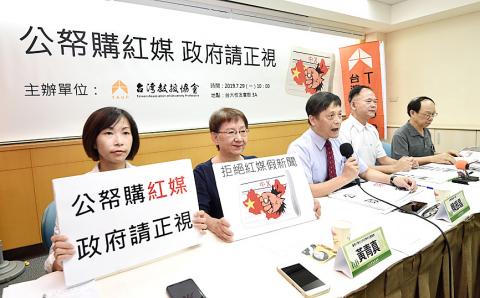The Taiwan Association of University Professors yesterday urged government agencies and state-owned enterprises to cancel their subscriptions to the Chinese-language China Times following allegations that the newspaper takes instructions from Beijing on how to prepare its news.
News presented from a China-centric perspective could pose a threat to Taiwanese society, yet the government has done little to address the issue, association president Lai Cheng-chang (賴振昌) told a news conference in Taipei.
“We do not want fake news from pro-China media outlets,” he said.

Photo: Peter Lo, Taipei Times
Following a report by London-based Financial Times earlier this month that the China Times takes orders on a daily basis from China’s Taiwan Affairs Office, the association looked into which government agencies and state-owned enterprises — from motor vehicle offices and post offices to the Bank of Taiwan and Chunghwa Telecom — subscribed to the newspaper, he said.
“A copy of the China Times was found in almost every one of them,” he said.
Food safety laws have been amended multiple times to protect people’s health and the government should take a similar approach to manage the media, National Taiwan University biochemical science and technology professor Huang Ching-jang (黃青真) said.
“Media outlets produce food for the mind and the government should have standards and management procedures for preventing that food from being poisoned,” she said.
National Taiwan Normal University Chinese associate professor Edwin Yang (楊聰榮) urged the government to adopt the idea of a “defensive democracy” and take action to address Beijing’s infiltration of Taiwanese media.
In Australia, Chinese infiltration is already being studied, he said, giving as an example the book Silent Invasion: How China is Turning Australia Into a Puppet State, which was published last year, adding that the Australian government has taken countermeasures.
That government agents and state-owned enterprises are widely subscribed to the China Times presents a serious issue, Taiwan Brain Trust member Chang Jen-chieh (張人傑) said.
It is unclear why they think that members of the public should read the newspaper, he added.
After the Financial Times’ report, Want Want China Times Media Group — which owns the China Times — said that it would file defamation lawsuits against the newspaper and other media companies that cited the report, said attorney Chen Yu-fan (陳雨凡), who is to compete for a legislative seat in the Xinyi-Southern Songshan district representing the New Power Party in next year’s elections.
The lawsuit could cause other media outlets to refrain from criticizing the group for fear of retaliation, she said.
Hopefully, the Legislative Yuan would pass a bill requiring individuals and organizations controlled by foreign governments or organizations to disclose such connections in the next legislative session, she added.

ANOTHER EMERGES: The CWA yesterday said this year’s fourth storm of the typhoon season had formed in the South China Sea, but was not expected to affect Taiwan Tropical Storm Gaemi has intensified slightly as it heads toward Taiwan, where it is expected to affect the country in the coming days, the Central Weather Administration (CWA) said yesterday. As of 8am yesterday, the 120km-radius storm was 800km southeast of Oluanpi (鵝鑾鼻), Taiwan’s southernmost tip, moving at 9kph northwest, the agency said. A sea warning for Gaemi could be issued tonight at the earliest, it said, adding that the storm is projected to be closest to Taiwan on Wednesday or Thursday. Gaemi’s potential effect on Taiwan remains unclear, as that would depend on its direction, radius and intensity, forecasters said. Former Weather Forecast

As COVID-19 cases in Japan have been increasing for 10 consecutive weeks, people should get vaccinated before visiting the nation, the Centers for Disease Control (CDC) said. The centers reported 773 hospitalizations and 124 deaths related to COVID-19 in Taiwan last week. CDC Epidemic Intelligence Center Director Guo Hung-wei (郭宏偉) on Tuesday said the number of weekly COVID-19 cases reported in Japan has been increasing since mid-May and surpassed 55,000 cases from July 8 to July 14. The average number of COVID-19 patients at Japan’s healthcare facilities that week was also 1.39 times that of the week before and KP.3 is the dominant

The Chinese Communist Party’s (CCP) working group for Taiwan-related policies is likely to be upgraded to a committee-level body, a report commissioned by the Mainland Affairs Council (MAC) said. As Chinese President Xi Jinping (習近平) is increasingly likely to upgrade the CCP’s Central Leading Group for Taiwan Affairs, Taiwanese authorities should prepare by researching Xi and the CCP, the report said. At the third plenary session of the 20th Central Committee of the CCP, which ended on Thursday last week, the party set a target of 2029 for the completion of some tasks, meaning that Xi is likely preparing to

US-CHINA TRADE DISPUTE: Despite Beijing’s offer of preferential treatment, the lure of China has dimmed as Taiwanese and international investors move out Japan and the US have become the favored destinations for Taiwanese graduates as China’s attraction has waned over the years, the Ministry of Labor said. According to the ministry’s latest income and employment advisory published this month, 3,215 Taiwanese university graduates from the class of 2020 went to Japan, surpassing for the first time the 2,881 graduates who went to China. A total of 2,300 graduates from the class of 2021 went to the US, compared with the 2,262 who went to China, the document showed. The trend continued for the class of 2023, of whom 1,460 went to Japan, 1,334 went to